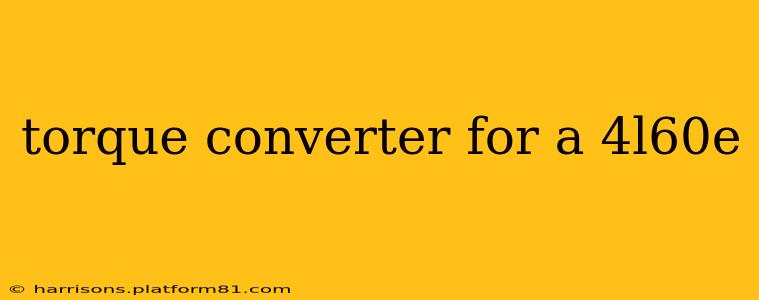The 4L60E transmission, a staple in General Motors vehicles for years, relies heavily on its torque converter for smooth operation and efficient power transfer. Choosing the right torque converter can significantly impact your vehicle's performance, fuel economy, and longevity. This guide delves into the intricacies of 4L60E torque converters, helping you understand the options and make an informed decision.
What is a Torque Converter?
Before we dive into specifics for the 4L60E, let's understand the fundamental role of a torque converter in an automatic transmission. It acts as a fluid coupling, transferring engine power to the transmission without a direct mechanical connection. This smooths out the initial power delivery, preventing jerky starts and providing a comfortable driving experience. The torque converter also multiplies torque at lower engine speeds, enabling easier acceleration, especially with heavier loads.
Different Types of 4L60E Torque Converters
Several types of torque converters are available for the 4L60E, each catering to different performance needs and driving styles:
Stock/OEM Torque Converters:
These are the converters that came originally equipped with your vehicle. They are generally designed for balance between performance and fuel efficiency. While reliable, they may not offer the same performance enhancements as aftermarket options.
Performance Torque Converters:
These converters are designed for enhanced performance. They typically feature:
- Higher stall speeds: A higher stall speed means the engine will rev higher before the torque converter fully locks up, resulting in quicker acceleration.
- Modified impeller designs: These can improve torque multiplication and overall efficiency.
- Different clutch designs: Optimized for improved engagement and holding power.
Performance converters are often categorized by their stall speed, expressed in RPM. A higher stall speed generally translates to more aggressive acceleration but can negatively impact fuel economy and may cause more engine wear if not used appropriately.
High-Stall Torque Converters:
These are a subset of performance converters, specifically engineered with significantly higher stall speeds. They are ideal for applications requiring maximum acceleration, such as drag racing or towing heavy loads. However, they generally compromise fuel efficiency at lower speeds.
Choosing the Right 4L60E Torque Converter
Selecting the appropriate torque converter depends largely on your vehicle's intended use and desired performance characteristics. Consider these factors:
- Vehicle application: Are you looking for improved daily driving, towing capacity, or drag racing performance?
- Engine modifications: Have you modified your engine? A more powerful engine might require a higher stall speed converter.
- Driving style: Do you prefer a more aggressive or relaxed driving experience?
- Budget: Performance converters are typically more expensive than stock units.
What Stall Speed Should I Choose?
The optimal stall speed is heavily dependent on your intended use. A general guideline:
- Street/Daily Driving: A slight increase in stall speed (e.g., 2000-2400 RPM) can provide noticeable improvements in acceleration without significantly sacrificing fuel economy.
- Towing: A moderately increased stall speed (e.g., 2400-2800 RPM) can help with pulling heavier loads.
- Performance/Racing: Higher stall speeds (e.g., 3000 RPM and above) are common for drag racing applications.
How Much Does a 4L60E Torque Converter Cost?
The price varies drastically depending on the type and brand. Stock replacements can be relatively inexpensive, while high-performance converters can cost several hundred dollars.
Can I Install a 4L60E Torque Converter Myself?
While technically possible, installing a torque converter is a complex process requiring specialized tools and knowledge. It's generally recommended to have a professional mechanic perform this installation.
What are the signs of a failing 4L60E torque converter?
Symptoms of a failing torque converter can include:
- Slipping: The transmission slips or hesitates during acceleration.
- Shudders: A shuddering sensation during acceleration.
- Rough shifting: Harsh or delayed gear changes.
- Loud noises: Unusual noises emanating from the transmission area.
This guide provides a foundation for understanding 4L60E torque converters. Remember to consult with a transmission specialist for personalized recommendations based on your specific vehicle and needs. Always prioritize safety and proper installation procedures when working on your vehicle's transmission.
